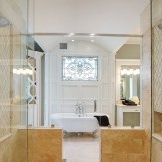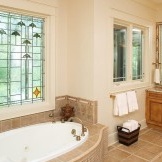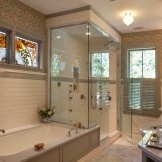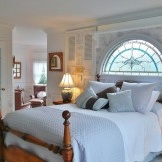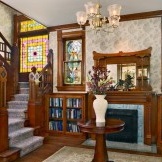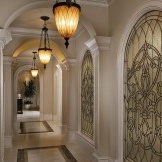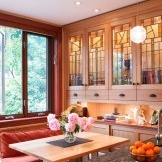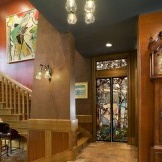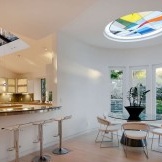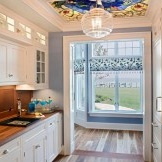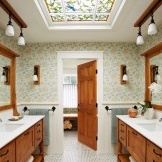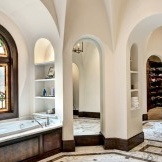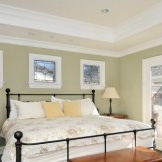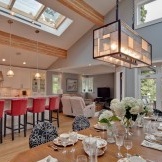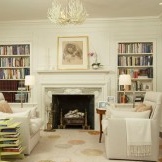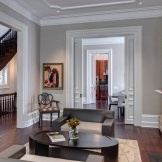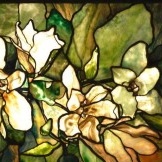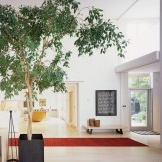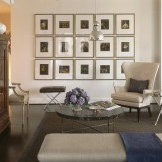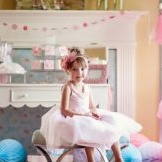Stained glass - magic in the interior
The word "stained glass" in many of us is associated with huge windows of castles or cathedrals, which let sunlight through us, spread over the walls with a multi-colored radiance. The splendor of such compositions cannot leave anyone indifferent. Such paintings from stained glass bring the chic and luxury of the Middle Ages into the room with notes of solemnity and even some kind of magic. And if earlier only window openings of temples and houses of great nobles were decorated with stained-glass windows, now they can be found in simple apartments. And the flight of design thought did not stop only at the windows, stained-glass windows are now used to decorate interior doors, wardrobes and all kinds of partitions that divide the room into zones. A constant companion of stained glass is light, which makes a real work of art out of a glass composition. The saturation and atmosphere of the room depend on the amount of light. So with the help of bright sunlight, a riot of colors breaks into the room, and using the muted artificial lighting you can create a cozy and even intimate atmosphere.
Types of Stained Glass
Stained glass compositions will fit into any interior style and become a real decoration of the apartment, while remaining functional elements. A drawing of such a picture can have a huge number of colors and shades that cause a lot of emotions or carry calm and peace expressed in delicate colors. It can be a simple geometric pattern or a whole composition with many small details made of transparent or absolutely “deaf” glass. There are plenty of options here, so everyone can choose a stained glass window for their apartment, based on their own tastes and preferences. The main task when choosing a stained glass composition is that you need to choose a stained glass window that harmoniously fits into the interior of the room and does not overload it. Depending on the manufacturing technology, you can choose both a rather expensive stained glass window and an economical option. Today there are several types of stained-glass windows:
- The classic version of a light and delicate stained glass composition is created using Tiffany technology. Its essence is that different pieces of glass are attached to each other with copper foil, creating a whole patterned canvas.
- The Fusing stained-glass window is created in several stages. First, a drawing is applied to the transparent glass, which is then laid out with colored glass and the entire structure is placed in a baking oven.
- A glass mosaic is a type of stained glass, for the manufacture of which glass modules are first made, and then they are interconnected.
- Painted or pseudo-stained-glass window is a fairly cheap option, which consists in the fact that the drawing on transparent glass is applied with special paints.
- Etched stained glass is a technology for creating patterns on glass, based on the use of a special acid, with the help of which, deep contours of patterns are applied.
- Film stained glass is made by gluing a multi-colored film on glass, resulting in a realistic imitation.


Stained Glass Ideas
The classic place to use stained glass windows are window openings. This is an excellent solution for rooms that need to be hidden from prying eyes. In this case, the design will not impede the penetration of daylight, which, passing through colored glass, will fill the room with multi-colored highlights. As a rule, such windows are installed in latrines or corridors where curtains will be inappropriate.
It has become very popular in our time to decorate interior doors with stained-glass windows, turning them into real works of art. This decor will look great in any light.Stained glass will look good both in the living room and in the bedroom, double and sliding doors are especially refined and luxurious.
It is not uncommon for designers to use stained glass panels in their ideas, which easily replace the usual paintings on the walls and create an original atmosphere. Such decor can be either hinged or built into the wall. This is a great idea for designing a long boring corridor in which you can arrange several so-called pseudo-windows along a free wall.
A favorite option for using stained glass compositions of almost all designers is sliding systems and partitions that divide the room into zones. This method of zoning introduces a special chic into the interior. The huge false windows in the studio apartment look beautiful, which, if necessary, move apart and combine the room into a single space. In the same way, you can separate the dining room or living room from the kitchen, this will allow during cooking to limit the spread of odors in the apartment. If, instead of such a system, a simple arch is preferable, then it can also be decorated by using stained-glass windows for its decor.

Furniture was no exception for such decor. With the help of various technologies for the manufacture of stained-glass windows, unique and one-of-a-kind objects are created - sliding wardrobes and different tables. Moreover, using the simplest techniques, such as painting or film stained glass, such a creation can be done independently.
Another popular use case for stained glass is illuminated ceiling structures. The result of this application is a huge lamp made of multi-colored glass. Speaking of lighting fixtures, at the peak of popularity are a variety of chandeliers and sconces with lampshades in stained glass technology, which will become a real decoration of the room.
How to choose a stained glass window for an apartment
First of all, when choosing a stained glass composition, you need to consider the color scheme of the room. Such decoration can be either a bright spot or a gentle complement to the main tone. You need to proceed from the overall picture of the entire interior. If the wall decoration is saturated, it is better to give preference to a more relaxed composition, but on the contrary, the walls of the room and furniture in restrained colors - the stained-glass window can be bright and saturated. Only in this case it will be necessary to supplement the interior with some bright decor elements so that all the elements look like a single whole.




